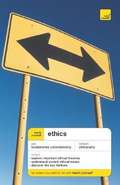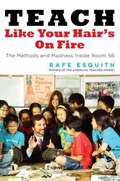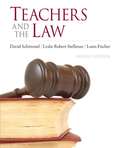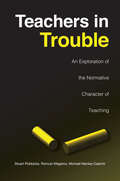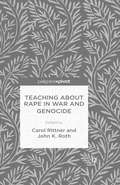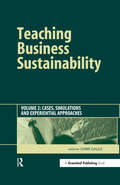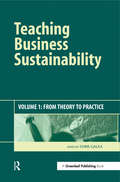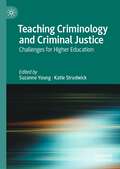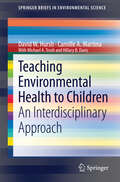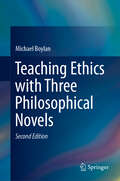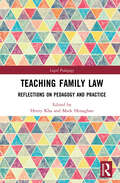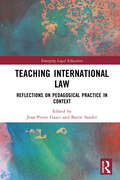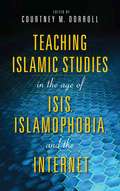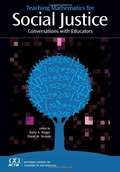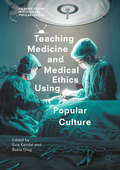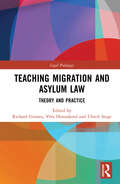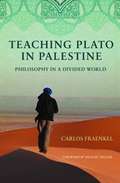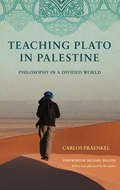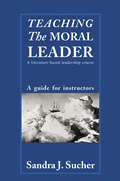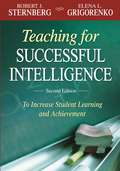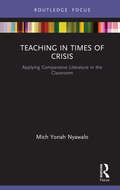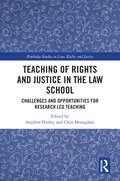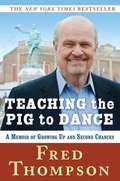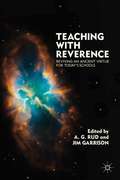- Table View
- List View
Teach Yourself Ethics
by Mel ThompsonDo you need an introduction to the main ethical theories? Would you like to understand current ethical issues? Do you want to develop your own moral awareness? From altruism to utilitarianism and Nietzsche to Marx, Ethics is a jargon-free introduction to key ethical theories and thinkers. It covers both the contribution of the major world religions to this fascinating subject as well as clear, thought-provoking discussions of applied ethics. The contemporary examples and issues in this latest edition ensure that this book challenges and engages you. Why not try, Philosophy, Psychology, Globalization, Philosophy of Mind, or visit www.books.mcgraw-hill.com? Book jacket.
Teach like Your Hair's on Fire: The Methods and Madness Inside Room 56
by Rafe EsquithThis book is an inspiring guide to transforming every child's education. In a Los Angeles neighborhood plagued by guns, gangs, and drugs, there is an exceptional classroom known as Room 56.
Teachers and the Law (8th Edition)
by Louis Fischer David Schimmel Leslie Robert StellmanThis book is about teachers and the law that affects them--law established by state and federal statutes, constitutions, and court decisions. The law has little significance unless educators know about it and make the effort to see that it is carried out. Our purpose in writing this book is not to encourage teachers to litigate.
Teachers in Trouble: An Exploration of the Normative Character of Teaching
by Michael Manley-Casimir Romulo Magsino Stuart PiddockeThe teacher who has an affair with a student. The teacher who is a transvestite. The teacher who advocates personal beliefs. These are 'teachers in trouble.' Their behaviour, whether it occurs in the classroom or off the job, offends the community and brings down censure from the school board.At root, schools are cultural institutions and teaching, a cultural activity. Teachers are expected to shape students according to accepted community norms. They interpret and apply curricula - and can divert curricula from their intended purpose. Teachers are at the eye of the vortex in the struggle for control over education, buffeted by the forces of social change and conflicting public expectations. The authors of this book examine how teacher conduct is monitored and what types of misconduct can produce 'social dramas.' Boards of reference have been established to arbitrate disputes between school boards and teachers who are dismissed. Drawing on the decisions of these boards of reference across Canada, the authors identify normative issues and propose a classification scheme for contentious behaviours.Teachers in Trouble poses fundamental questions about the role of teachers in society. It is an invaluable guide for teachers and professional organizations, education administrators, and members of the community who are concerned about ethics in our schools.
Teaching About Rape in War and Genocide
by John K. Roth Carol RittnerThis edited volume is both a guide for educators and a resource for everyone who wants to strengthen resistance against a major atrocity that besieges human development. Its contributors explore a crucial question: how to teach about rape in war and genocide?
Teaching Business Sustainability Vol. 2: Cases, Simulations and Experiential Approaches
by Chris GaleaIf there is one area of business education that requires out-of-the-box, creative thinking it is sustainability. Business sustainability, because of its relative newness (and hence uncertainty), its dependence on interdisciplinary thinking, its need to work with different stakeholders and its non-traditional operating approaches, demands that we train our managers in wholly new ways. This need for new and non-traditional teaching approaches is reflected in this collection of unorthodox teaching pedagogies. The underlying philosophy behind them is that deep learning for sustainability needs ultimately to be experiential: that is, learning while doing rather than a passive absorption of facts and figures. While much of the underlying theory of sustainability may be taught using more traditional lecture and reading approaches, the implementation of true business sustainability requires students to experiment – to win and lose – while grappling with the myriad challenges and frustrations posed by sustainability: the same challenges and frustrations, one might add, that companies intent on implementing sustainability face on a daily basis in the world in which they operate. The aim is to create a learning environment where students themselves take control over their own learning. This book – a companion volume to Teaching Business Sustainability 1: From Theory to Practice (Greenleaf Publishing, 2004) – focuses on four main categories of experiential pedagogy: case studies, hands-on exercises, role-play simulations and active learning teaching exercises. It includes contributions from a range of experts in global sustainability education who provide their expertise with class-hardened teaching materials. Teaching Business Sustainability 2 will be an invaluable resource both for educators working in a wide range of academic disciplines, looking for inspiration and guidance on how to teach business sustainability, as well as for organisations looking to reinvigorate internal management education programmes to factor in corporate responsibility and sustainability issues.
Teaching Business Sustainability: From Theory to Practice
by Chris GaleaThere are many challenges facing educators in the field of sustainability. This text aims to analyze the state of the art in teaching business sustainability worldwide, and what teaching practices and tools are achieving successful results.
Teaching Criminology and Criminal Justice: Challenges for Higher Education
by Suzanne Young Katie StrudwickThis book addresses the challenges within teaching Criminology and Criminal Justice, for students studying and academics involved in designing and delivering courses at an undergraduate and postgraduate level. The book highlights a number of contemporary issues through a wide context of themes and reflections of practice. The chapters are arranged in thematic parts: firstly ‘the challenges of diversity and inclusion’ secondly ‘challenges of creating authentic learning environments', and lastly ‘the challenge of creating transformative conversation’. These themes discuss different teaching approaches and present materials which address questions relevant for meeting the challenges. The book focuses on the role and impact of teaching Criminology and Criminal Justice in the real world and explores debates which have autonomy in their questioning and overlapping themes. The narratives reflect upon others’ experiences and explore transformative learning and innovation in Criminology and Criminal Justice.
Teaching Environmental Health to Children
by David W. Hursh Hilarie B. Davis Camille A. Martina Michael A. TrushEvery day we are exposed to toxins and toxicants that can impact our health. Yet we rarely teach elementary and secondary students about these exposures and how they can reduce their risk to them. In this book we highlight activities and curriculum developed at nine universities in the United States from a grant funded by the National Institute of Environmental Health Sciences. Our goal is to extend these lessons to a global audience and for classroom teachers of all subjects and age levels to include environmental health in their teaching. 'An invaluable tool for equipping informed citizens to think about the environment and its human impacts --both the science, and equally important, the social and ethical dimensions' , Howard Frumkin, M.D., Dr. P.H., Dean, School of Public Health, University of Washington, Seattle, WA, USA
Teaching Ethics with Three Philosophical Novels
by Michael BoylanThis book offers a unique method for teaching ethics and social/political philosophy by combining primary texts and resource material along with three philosophical novels so that students can apply the abstract principles to real-life situations. A sample syllabus and sample assignments are provided. This second edition contains an additional teacher's manual, guiding instructors in how to effectively put together a course in ethics using fiction. Students often turn-off when confronted with abstract ethical principles, alone. This book allows interaction with philosophical novels that provide real-life situations that mirrors applying normative principles to lived experience. Students will be drawn into this realism and their engagement with the material will be significantly enhanced. This is an innovative textbook for teachers and students of general philosophy, ethics, business ethics, social and political philosophy, as well as students of literature and philosophy.
Teaching Family Law: Reflections on Pedagogy and Practice (Legal Pedagogy)
by Henry Kha and Mark HenaghanThis book provides a comprehensive analysis of the teaching of an eclectic range of family law topics and the unique opportunities and challenges of teaching family law in different jurisdictions from a varied international perspective. Written by leading legal scholars, the book addresses a gap in the scholarship to comprehensively and systematically analyse the teaching of family law. The first part of the book explores ways of teaching the varied range of topics under the heading of family law and captures the diverse approaches to the discipline. Chapters illustrate how the subject can be best taught in an interdisciplinary way that considers feminist perspectives and the philosophy of teaching, while encompassing legal positivism, empirical research and critical legal theory. The second part of the book examines teaching in different jurisdictions and illustrates policy and practice in Australia, New Zealand, the United States, Canada, the United Kingdom, Hong Kong and South Africa. Showcasing examples of best practice of teaching family law, the book will be an essential reading for legal scholars, as well as researchers and postgraduate students in the fields of family law and legal education.
Teaching International Law: Reflections on Pedagogical Practice in Context (ISSN)
by Barrie Sander Jean-Pierre GauciThe practice of teaching international law is conducted in a wide range of contexts across the world by a host of different actors – including scholars, practitioners, civil society groups, governments, and international organisations.This collection brings together a diversity of scholars and practitioners to share their experiences and critically reflect on current practices of teaching international law across different contexts, traditions, and perspectives to develop existing conversations and spark fresh ones concerning teaching practices within the field of international law. Reflecting on the responsibilities of teachers of international law to engage with and confront histories, contemporary crises, and everyday events in their teaching, the collection explores efforts to decenter the teacher and the law in the classroom, opportunities for dialogical and critical approaches to teaching, and the possibilities of co-producing non-conventional pedagogies that question the mainstream underpinnings of international law teaching. Focusing on the tools and techniques used to teach international law to date, the collection examines the teaching of international law in different contexts. Traversing a range of domestic and regional contexts around the world, the book offers insights into both the culture of teaching in particular domestic settings, aswell as the structural challenges and obstacles that arise in terms of who, what, and how international law is taught in practice.Offering a unique window into the personal experiences of a diversity of scholars and practitioners from around the world, this collection aims to nurture conversations about the responsibilities, approaches, opportunities, and challenges of teaching international law.
Teaching Islamic Studies in the Age of ISIS, Islamophobia, and the Internet
by Courtney M. DorrollHow can teachers introduce Islam to students when daily media headlines can prejudice students' perception of the subject? Should Islam be taught differently in secular universities than in colleges with a clear faith-based mission? What are strategies for discussing Islam and violence without perpetuating stereotypes? The contributors of Teaching Islamic Studies in the Age of ISIS, Islamophobia, and the Internet address these challenges head-on and consider approaches to Islamic studies pedagogy, Islamaphobia and violence, and suggestions for how to structure courses. These approaches acknowledge the particular challenges faced when teaching a topic that students might initially fear or distrust. Speaking from their own experience, they include examples of collaborative teaching models, reading and media suggestions, and ideas for group assignments that encourage deeper engagement and broader thinking. The contributors also share personal struggles when confronted with students (including Muslim students) and parents who suspected the courses might have ulterior motives. In an age of stereotypes and misrepresentations of Islam, this book offers a range of means by which teachers can encourage students to thoughtfully engage with the topic of Islam.
Teaching Law
by Robin L. WestTeaching Law reimagines law-school teaching and scholarship by going beyond crises now besetting the legal academy and examining deeper and longer-lasting challenges. The book argues that the legal academy has long neglected the needs to focus teaching and scholarship on the ideals of justice that law fitfully serves, the political origins of law, and the development of a respectful but critical relationship with the legal profession. This book suggests reforms to improve the quality of legal education and responds to concerns that law schools eschew the study of justice, rendering students amoralist; that law schools slight the political sources of law, particularly in legislative action; and that law schools have ignored the profession entirely. These areas of neglect have impoverished legal teaching and scholarship as the academy is refashioned in response to current financial exigencies, and addressing them is long overdue.
Teaching Mathematics for Social Justice: Conversations with Educators
by David W. Stinson Anita A. WagerMathematics as a Catalyst for Change for ALL Students. <P><P>Educators increasingly recognize the important role that mathematics teaching plays in helping students to understand and overcome social injustice and inequality. This collection of original articles is the start of a compelling conversation among some of the leading figures in critical and social justice mathematics, a number of teachers and educators who have been inspired by them and who have inspiring stories of their own to tell and any reader interested in the intersection of education and social justice. An important read for every educator, this book shows how to teach mathematics so that all students are given the tools they need to confront issues of social justice today and in the future.
Teaching Medicine and Medical Ethics Using Popular Culture
by Evie Kendal Basia DiugThis book demonstrates how popular culture can be successfully incorporated into medical and health science curriculums, capitalising on the opportunity fictional media presents to humanise case studies. Studies show that the vast majority of medical and nursing students watch popular medical television dramas and comedies such as Grey's Anatomy, ER, House M. D. and Scrubs. This affords us with a unique opportunity to engage and inform not only students but the general public and patients further downstream. This volume analyses examples of medical-themed popular culture and offers various strategies and methods for educators in this field to integrate this material into their teaching. The result is a fascinating read and original resource for medical professionals and teachers alike.
Teaching Migration and Asylum Law: Theory and Practice (Legal Pedagogy)
by Richard Grimes Ulrich Stege Věra HonuskováThis highly topical book demonstrates the theoretical and practical importance of the study of migration law. It outlines approaches that may be taken in the design, delivery and monitoring of this study in law schools and universities to ensure an optimum level of learning. Drawing on examples of best practice from around the world, this book uses a theoretical framework and examples from real clients to simulations to help promote the learning and teaching of the law affecting migrants. It showcases contributions from over 30 academics and practitioners experienced in asylum and immigration law and helps to unpick how to teach the complex international laws and procedures relating to migration between different countries and regions. The various sections of the book explore educational best practice, what content can be covered, models for teaching and learning, strategies to deal with challenges and ways forward. The book will appeal to scholars, researchers and practitioners of migration and asylum law, those teaching migration law electives and involved in curriculum design, as well as students of international, common and civil law.
Teaching Plato in Palestine
by Michael Walzer Carlos FraenkelTeaching Plato in Palestine is part intellectual travelogue, part plea for integrating philosophy into our personal and public life. Philosophical toolkit in tow, Carlos Fraenkel invites readers on a tour around the world as he meets students at Palestinian and Indonesian universities, lapsed Hasidic Jews in New York, teenagers from poor neighborhoods in Brazil, and the descendants of Iroquois warriors in Canada. They turn to Plato and Aristotle, al-Ghazālī and Maimonides, Spinoza and Nietzsche for help to tackle big questions: Does God exist? Is piety worth it? Can violence be justified? What is social justice and how can we get there? Who should rule? And how shall we deal with the legacy of colonialism? Fraenkel shows how useful the tools of philosophy can be--particularly in places fraught with conflict--to clarify such questions and explore answers to them. In the course of the discussions, different viewpoints often clash. That's a good thing, Fraenkel argues, as long as we turn our disagreements on moral, religious, and philosophical issues into what he calls a "culture of debate." Conceived as a joint search for the truth, a culture of debate gives us a chance to examine the beliefs and values we were brought up with and often take for granted. It won't lead to easy answers, Fraenkel admits, but debate, if philosophically nuanced, is more attractive than either forcing our views on others or becoming mired in multicultural complacency--and behaving as if differences didn't matter at all.
Teaching Plato in Palestine: Philosophy in a Divided World
by Michael Walzer Carlos FraenkelTeaching Plato in Palestine is part intellectual travelogue, part plea for integrating philosophy into our personal and public life. Philosophical toolkit in tow, Carlos Fraenkel invites readers on a tour around the world as he meets students at Palestinian and Indonesian universities, lapsed Hasidic Jews in New York, teenagers from poor neighborhoods in Brazil, and the descendants of Iroquois warriors in Canada. They turn to Plato and Aristotle, al-Ghaz?l? and Maimonides, Spinoza and Nietzsche for help to tackle big questions: Does God exist? Is piety worth it? Can violence be justified? What is social justice and how can we get there? Who should rule? And how shall we deal with the legacy of colonialism? Fraenkel shows how useful the tools of philosophy can be--particularly in places fraught with conflict--to clarify such questions and explore answers to them. In the course of the discussions, different viewpoints often clash. That's a good thing, Fraenkel argues, as long as we turn our disagreements on moral, religious, and philosophical issues into what he calls a "culture of debate." Conceived as a joint search for the truth, a culture of debate gives us a chance to examine the beliefs and values we were brought up with and often take for granted. It won't lead to easy answers, Fraenkel admits, but debate, if philosophically nuanced, is more attractive than either forcing our views on others or becoming mired in multicultural complacency--and behaving as if differences didn't matter at all.
Teaching The Moral Leader: A Guide for Instructors
by Sandra J. SucherThis book is a comprehensive, practical manual to help instructors integrate moral leadership in their own courses, drawing from the experience and resources of the Harvard Business School course 'The Moral Leader', an MBA elective taken by thousands of HBS students over nearly twenty years. Through the close study of literature--novels, plays, and historical accounts-- followed by rigorous classroom discussion, this innovative course encourages students to confront fundamental moral challenges, to develop skills in moral analysis and judgment, and to come to terms with their own definition of moral leadership. Using this guide's background material and detailed teaching plans, instructors will be well prepared to lead their students in the study of this vital and important subject. Featuring a website to run alongside that links the manual with the textbook and provides a wealth of extra resources, including on-line links to Harvard Business School case studies and teaching notes this manual forms a perfect complement to The Moral Leader core text also by Sandra Sucher. The detailed and hands-on nature of the guide makes it possible for instructors, with or without a specialized background, to replicate the 13-session Harvard Business School course, or to integrate moral leadership into an existing course, or as a module, or as stand-alone sessions. The manual presents flexible class plans, easily adaptable to a wide variety of business and academic topics. It suggests how to adapt the course to other settings, provides supporting materials, and reviews the approach to teaching "The Moral Leader," differentiating it from other literature-based courses. The author, a Harvard Business School professor with a successful record in teaching this course, also brings into the text the kind of real world understanding of effective leadership development that comes from decades of experience as a high level corporate executive. An accompanying student book, focused on class preparation and the context of each work, helps students address questions like: What is the nature of a moral challenge? How do people "reason morally"? How do leaders – formal and informal – contend with the moral choices they face? How is moral leadership different from leadership of any other kind? Struggling with these questions, both individually and as members of a vibrant learning community, students internalize moral leadership concepts and choices, and develop the skills to pursue it in their careers and personal lives.
Teaching for Successful Intelligence: To Increase Student Learning and Achievement
by Robert Sternberg Elena GrigorenkoCoauthored by two internationally renowned educators and researchers, this resource helps teachers strengthen their classroom practice with lessons that promote successful intelligence--a set of abilities that allow students to adapt and succeed within their environment, make the most of their strengths, and learn to compensate for their weaknesses.
Teaching in Times of Crisis: Applying Comparative Literature in the Classroom (Routledge Studies in Comparative Literature)
by Mich Yonah NyawaloTeaching in Times of Crisis explores how comparative methods, which are instrumental in reading and teaching works of literature from around the world, also provide us with tools to dissect and engage the moments of crises that permeate our contemporary political realities. The book is written in the form of a series of classroom reflections—or memos—capturing the political environment preceding and proceeding the 2016 US presidential election. It examines the ways in which the ethics involved in reading comparatively can be employed by teachers and students alike to map and foster "lifelines for cultural sustainability" (to borrow the term from Djelal Kadir’s Memos from the Besieged City) that are essential for creating and maintaining a healthy multicultural society. Nyawalo achieves this through comparative readings of postcolonial films, LGBTQ texts, French slam poetry, as well as episodes from Star Trek: The Next Generation, among other materials. The classroom reflections captured in each memo are shaped by the Appalachian setting in which the discussions and lessons took place. Inspired by this setting, the author develops pedagogic ethics of comparison—a method of reading comparatively—which privileges the local educational spaces in which students find themselves by mapping the contested cultural politics of Appalachian realities onto a world literature curriculum.
Teaching of Rights and Justice in the Law School: Challenges and Opportunities for Research Led Teaching (Routledge Studies in Law, Rights and Justice)
by Stephen Hurley and Chris MonaghanThis book examines the challenges of bringing cutting-edge research in often controversial areas into the law syllabus and explores how academics can effectively adopt a holistic approach to research and pedagogy when teaching rights and justice. The collection brings together experts from all areas of legal scholarship to discuss how they fuse often controversial aspects of rights and justice into their teaching in a way that responds to and is ultimately led by academic research. As such, it advances legal education through the opportunity to explore the interplay between rights and justice and how scholars both ensure that their teaching is research-led, whilst responding to the needs and views of students and issues such as generational differences in viewpoints on controversial issues. This topical volume will appeal to academics and researchers interested in academic freedom, the challenges of research-led teaching and the pedagogy around the teaching of rights and justice.
Teaching the Pig to Dance: A Memoir of Growing Up and Second Chances
by Fred ThompsonFred Thompson has enjoyed a remarkable career in Hollywood and politics, but when he sat down to write a memoir about how he got to be the person he is, he discovered that his best stories all seemed to come out of the years he spent growing up in and around his hometown of Lawrenceburg, Tennessee. It was a small town but not the smallest--after all, it was the county seat and it did have a courthouse, a couple of movie theaters, and its own Davy Crockett statue. For truly small, you had to travel to nearby Summertown, where the regular Sunday dinner was possum and chocolate gravy. But Lawrenceburg is where Fred got to be a kid, found his share of trouble and scrapes, came to know folks he didn't realize were so colorful at the time but sure does now, got married, had a few kids, became a man, and started his career as a country lawyer (pretty much in that order). And as Fred tells it, getting that law degree was something of a surprise for him, since in school he'd been less than stellar as a scholar. "Teaching Latin to someone like me," he says, "was like trying to teach a pig to dance. It's a waste of the teacher's time and it irritates the pig." In these reflections, as hilarious as they are honest and warm, Fred touches on the influences--family, hometown neighbors and teachers, team sports, jobs, romances, and personal crises--that molded his character, his politics, and the way he looks at life today. We get to know the unforgettable characters who congregated at the Blue Ribbon Cafe, like the rotund gentleman called "Shorty," whose claim to fame was his ability to quickly suck in his stomach and cause his pants to fall to the floor. Or Fred's Grandma Thompson, who became an early TV adopter for the sole purpose of watching Wrestling from Hollywood and who once had a "gourder" removed from her neck and subsequently walked around town with it in a handkerchief showing it to folks. One day Fred and an accomplice placed small explosive Fourth of July "cracker balls" under the four legs of their teacher's chair; Mrs. Garner sat down and, despite the racket, didn't flinch so much as a muscle--but Fred felt a twinge of the one emotion he hated most: shame. Fred idolized Coach Staggs from his high school football days, even though he was "like Captain Ahab without the humor" and didn't like smart alecks, comics, or individualists, which put the young Fred at a disadvantage. More than anyone else from those days though, Fred remembers his mom and dad, who taught him that kids are shaped most of all by the love and support they can take for granted. Teaching the Pig to Dance will delight everyone who admires Fred Thompson for his contributions to politics or for his work in movies and on TV, along with all those who just love to hear rollicking but unforgettable stories about growing up in a place where, as one of the local old-timers put it, "We weren't big enough to have a town drunk, so a few of us had to take turns."
Teaching with Reverence
by Jim Garrison A. G. RudReverence is a forgotten virtue in teaching and learning. When taken in a broader spiritual sense, it is often associated with a mute and prim solemnity. The essays gathered here examine reverence as a way to understand some of the spiritual dimensions of classroom teaching.
